Lessons from ZEEKR for the Automotive Industry
![]() 08/15 2024
08/15 2024
![]() 519
519
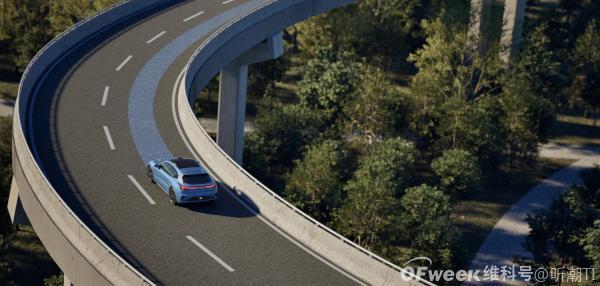
Author/Guo Jiayi
Editor/Zhang Xiao
ZEEKR has disabled comments on social media, but it cannot quell the anger of existing car owners.
On August 13, ZEEKR launched the 2025 models of its 001 and 007 vehicles. However, due to the rapid pace of upgrades and the higher specifications and lower prices of the new models, combined with a lack of necessary pre-launch hype, this sparked significant dissatisfaction among existing car owners.
Currently, some car owners have reportedly gone to dealerships to seek redress, and there are also numerous users denouncing ZEEKR on social media.
The 001 is ZEEKR's first model and has contributed the most to its sales to date. A new version was just launched at the end of February this year. Less than six months later, the 2025 model was introduced, with significant upgrades including ZEEKR's self-developed intelligent driving system and a switch to NVIDIA chips (with 10 times the computing power of the 2024 model).
The 007 is ZEEKR's newer model, launched on December 27 last year, less than a year ago. The latest 2025 model features the latest ultra-fast charging battery and a price reduction of 20,000 to 30,000 yuan compared to the previous model.
Objectively speaking, as competition in the new energy vehicle market intensifies, it is normal for automakers to accelerate product iterations based on technological advancements to enhance their market competitiveness. Occasional conflicts with existing car owners during this process are also understandable.
This year, ZEEKR is not alone among automakers facing criticism for "betraying" existing car owners due to model upgrades and price cuts. However, few have sparked large-scale criticism from car owners like ZEEKR is currently experiencing.
Where lies the root of ZEEKR's problems?
In this article, we aim not just to discuss this issue but to analyze the lessons ZEEKR has imparted to the industry through this unsuccessful model iteration.
01 Being too hasty and overly focused on "competition" can easily lead to confusion
If not for this current controversy, ZEEKR would have had a solid performance this year.
In the first seven months of this year, ZEEKR delivered 104,000 vehicles, an 89% increase year-on-year, far exceeding the industry growth rate of pure electric vehicles in the Chinese market. According to the China Association of Automobile Manufacturers, sales of pure electric vehicles in the Chinese market reached 3.57 million units in the first seven months of this year, up 10.1% year-on-year.
ZEEKR's sales target for 2024 is 230,000 vehicles. Based on sales in the first seven months, achieving this target will be challenging but not impossible. ZEEKR has stated that two new models, including an SUV and an MPV, will be launched in the second half of the year, and it is also expanding into overseas markets, expressing confidence in meeting its annual sales target.
Earlier this year, in May, ZEEKR listed on the New York Stock Exchange, setting a new record for the fastest IPO in the history of new energy vehicles: just 37 months from the brand's launch on April 15, 2021.
However, this unexpected controversy has added significant uncertainty to ZEEKR's outlook for the coming months.
Conversely, if ZEEKR had not been so eager to launch the new 001 and 007 models, perhaps waiting a few more months until the end of the year, the situation might have been better.
But ZEEKR was unwilling to wait. It was eager to address its shortcomings in intelligent driving and capture consumers' attention with its new models.
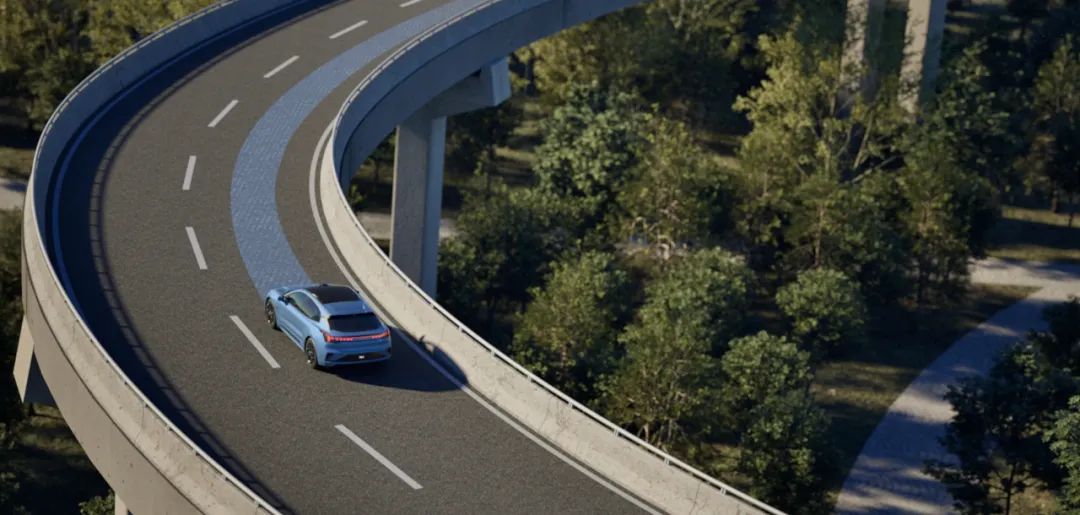
Image/ZEEKR Official Website
ZEEKR does not stand out in terms of competitive advantage in intelligent driving. In recent years, its intelligent driving system and cockpit have been frequently criticized by consumers.
A significant reason is that ZEEKR's earlier products primarily used Mobileye's system, and the 2024 model of the 001 continues to use Mobileye's solution. However, in recent years, due to issues such as low computing power and closed systems, Mobileye has been largely abandoned by domestic new energy vehicle makers, who have turned to chip suppliers like NVIDIA and Horizon Robotics with higher computing power and more open systems.
Against this backdrop, once the intelligent driving R&D team completed the task of integrating ZEEKR's self-developed intelligent driving solution, the company eagerly unveiled it.
In fact, ZEEKR's move is closely related to the increasingly fierce market competition.
Firstly, intelligent driving is becoming increasingly important in automakers' competition. A previous research report by Huaxi Securities stated that intelligent driving has already significantly influenced consumers' purchasing decisions. In the future, leading automakers that can accurately identify differentiated selling points and technological advancements will differentiate themselves in the "standard intelligent driving" era and maintain a leading edge for over two years.
ZEEKR also noted in its "ZEEKR 2025 Model Launch Q&A" that its own Net Promoter Score (NPS) survey found that intelligent driving is a factor influencing consumers' choice of the ZEEKR 001.
Secondly, all the models currently sold by ZEEKR are pure electric vehicles. However, the growth rate of the pure electric vehicle market in China's new energy vehicle market has further slowed down this year, putting considerable pressure on automakers.
As mentioned earlier, sales of pure electric vehicles in the Chinese market grew by 10.1% in the first seven months of this year. In contrast, sales of plug-in hybrid electric vehicles (including range extenders) reached 2.361 million units, a year-on-year growth of 84.5%. Focusing on July alone, sales of pure electric vehicles increased by only 2.6% year-on-year to 551,000 units, while sales of plug-in hybrid models grew by 80.7% to 438,000 units.
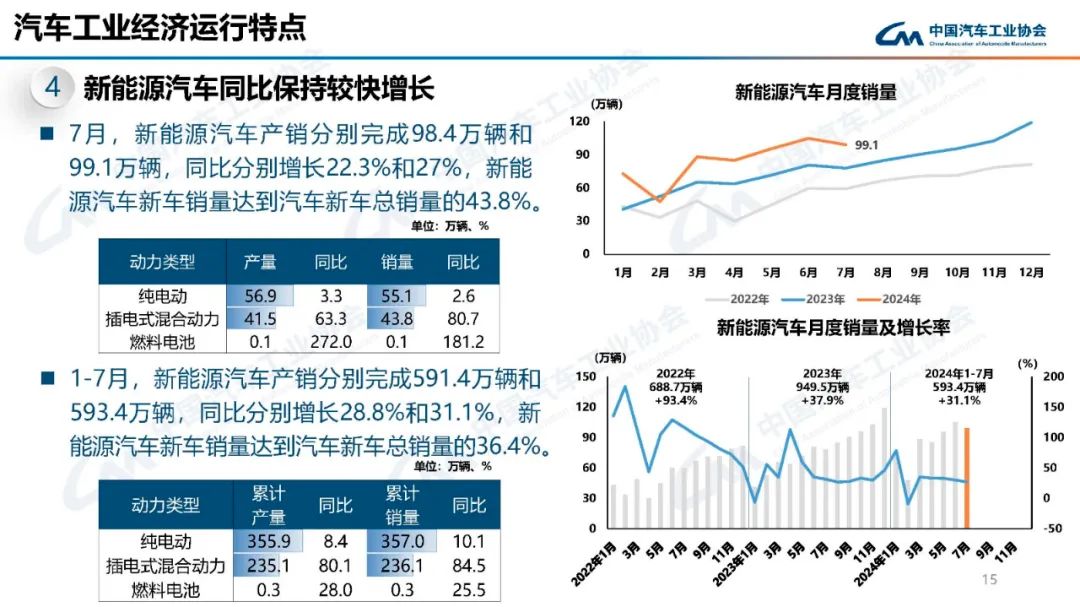
Image/China Association of Automobile Manufacturers
From this perspective, ZEEKR's desire to establish a foothold in consumers' minds through its new intelligent driving narrative is understandable.
"It can only be said that the market is too competitive. When you have something good, you definitely want to bring it to market as soon as possible to expand your advantages, especially when the 007 has not met expectations. When ZEEKR has a better hand, it naturally wants to switch faster," said an automotive industry insider to the media.
However, the key is that before the launch event, ZEEKR did not adequately prepare, especially in terms of compensating the rights and interests of existing users and addressing their emotional changes in advance.
This is why ZEEKR's primary action, from the live broadcast of the launch event to subsequent statements, was simply to disable comments.
02 Don't take chances
The most significant source of dissatisfaction among car owners in this controversy involving ZEEKR is not the model upgrades themselves but rather ZEEKR's attitude towards these upgrades.
There are two main points:
First, rumors of ZEEKR's 001 switching to a self-developed intelligent driving system had been circulating in the market since earlier this year. The most recent rumor was in July, claiming that ZEEKR would release an updated 001 at the end of the month.
ZEEKR denied these rumors.
As shown in the image below, on July 12, ZEEKR's Legal Department officially released a clarification microblog, stating that it would "severely investigate and hold accountable such illegal behaviors." Shortly thereafter, ZEEKR's CMO Guan Haitao retweeted this rumor-debunking microblog and offered a ZEEKR 7x as a reward to the source of the "rumor."
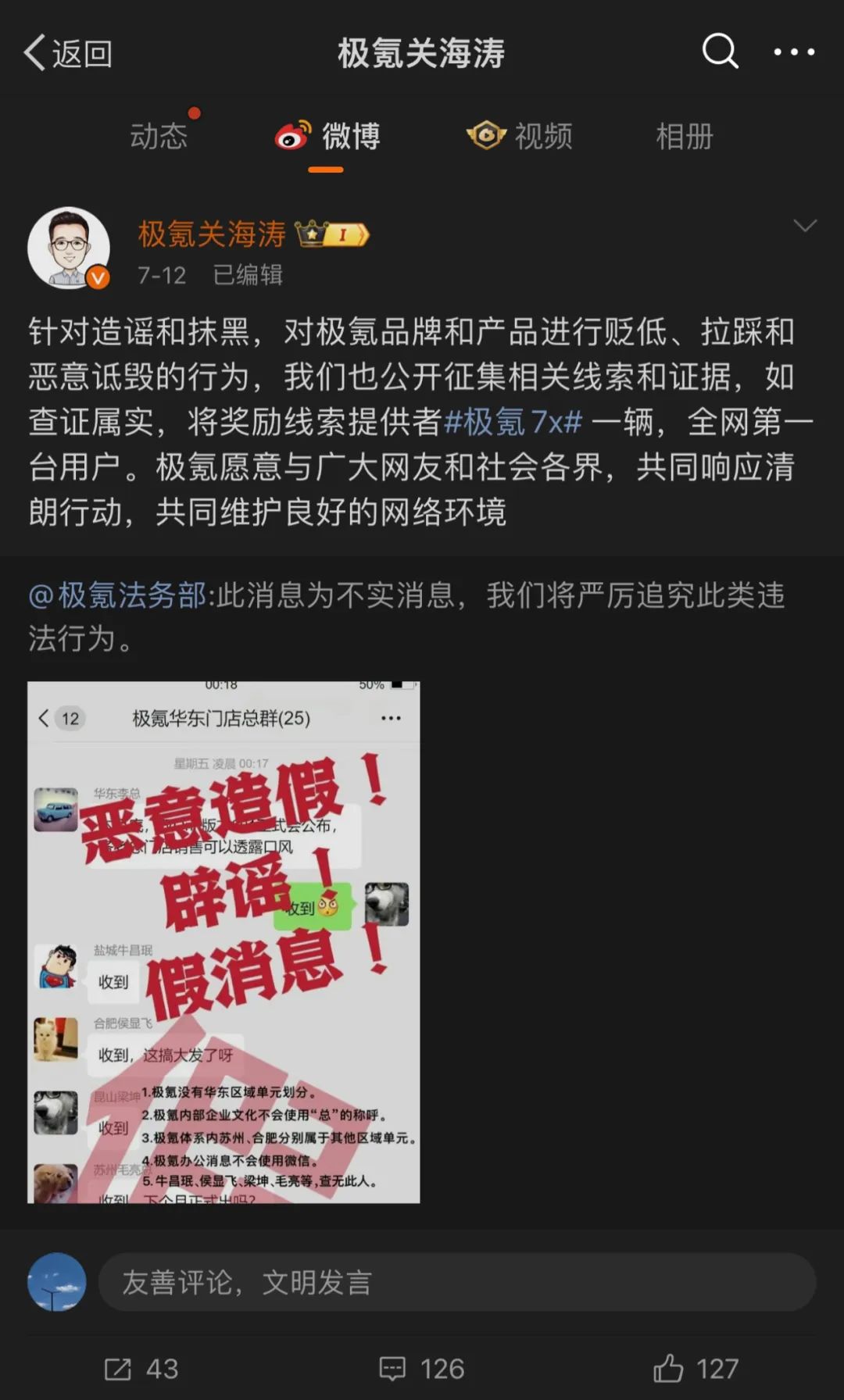
Image/ZEEKR CMO Guan Haitao's Weibo
Currently, comments are disabled on both microblogs, and the official microblog of ZEEKR's Legal Department cannot be followed.
Second, many car owners reported that they repeatedly confirmed with sales staff before purchasing the 2024 model of the ZEEKR 001 whether an updated model would be released, only to be denied each time.
For example, according to media reports, a car owner who picked up their car on August 4 stated that ZEEKR sales staff announced a decrease in benefits at the end of July, emphasizing the need to place orders for available vehicles.
However, a nuanced point is that many dealerships were also unaware of the 001 update plans. According to self-media reports, sales staff at two ZEEKR dealerships in Beijing stated that they were unaware of the update plans before the launch event.
Combining these two points, if it were only a model update, the anger among car owners might not have been so intense. However, ZEEKR's failure to adequately preheat the launch, coupled with its official denials and CMO's personal debunking of rumors just one month before the updated model's release, are the root causes of car owners' anger.
Another noteworthy point is that the "ZEEKR 2025 Model Launch Q&A" mentions that ZEEKR 001 owners cannot pay to upgrade to the Haohan intelligent driving solution. ZEEKR states that the version of the ZEEKR 001 using the Haohan intelligent driving solution employs a different layout from the Mobileye solution in terms of underlying chips, system deployment, and wiring harness layout, making them two separate systems at the software and hardware levels.
However, ZEEKR also mentions that the intelligent driving system of the 2024 model of the ZEEKR 001 will continue to receive updates. It states that the Auto Park feature has been fully rolled out, and the High-Speed Navigate on Autopilot (NZP) feature covers more than 97% of the regions where ZEEKR users reside. The city NZP feature of the Mobileye solution is being actively developed and is expected to be delivered in batches within this year.
Furthermore, the 2024 and 2025 models of the ZEEKR 001 will maintain synchronized updates in terms of smart cockpit functionality.
Based on this, it is the sales strategy in this controversy that is truly questionable for ZEEKR.
On July 13, ZEEKR indirectly reduced the price of the 001 by introducing a one-month "July Limited-Time Purchase Benefit," offering customers a maximum purchase benefit of 35,000 yuan. This timing is also subtle, as it was exactly one month before ZEEKR announced the 2025 model of the 001.
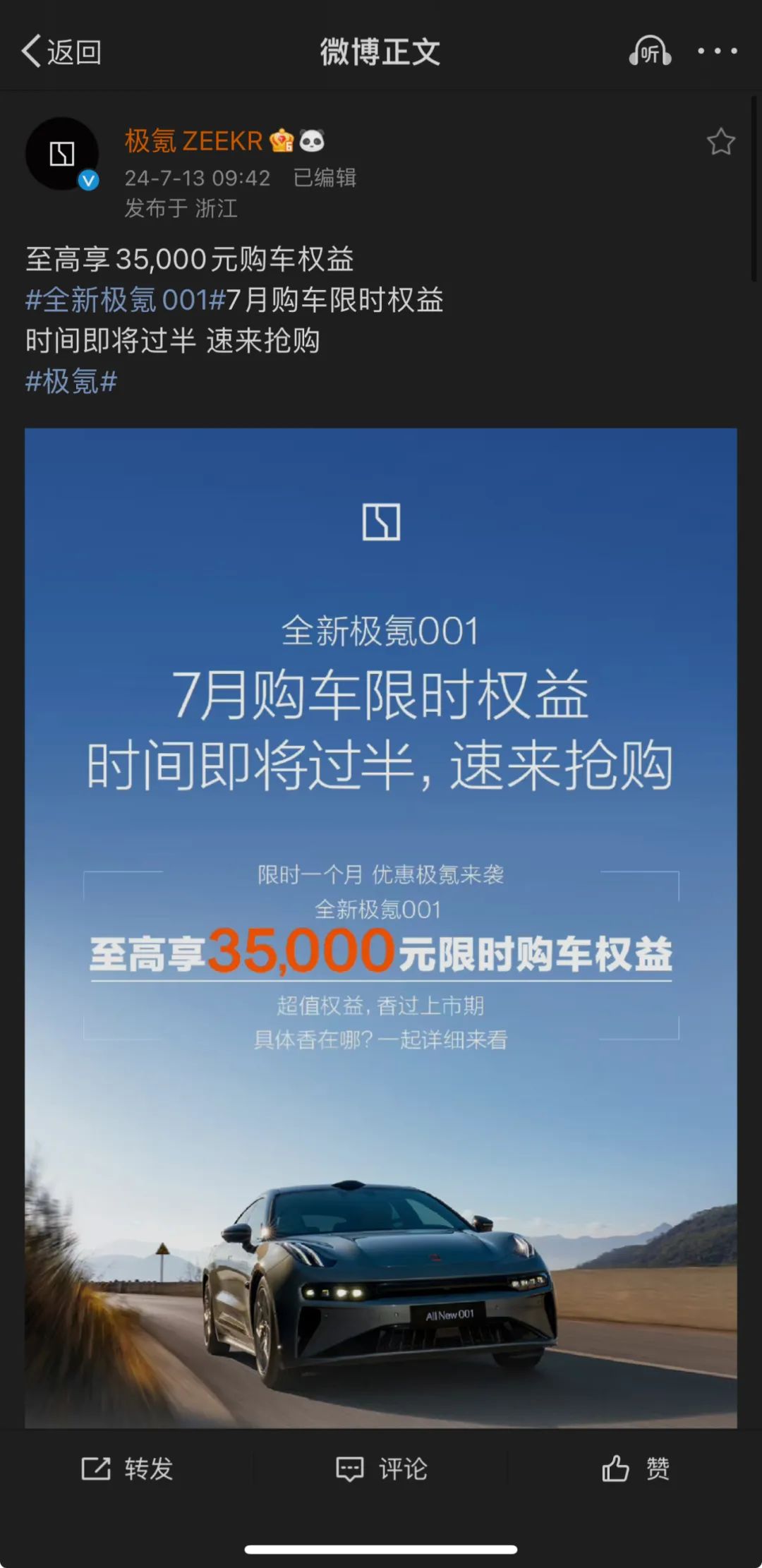
ZEEKR launched limited-time purchase benefits on July 13, Image/ZEEKR's official Weibo
ZEEKR's intention is clear: to sell as many 2024 models of the 001 as possible before the updated model's release, making way for the new model.
However, ZEEKR remained silent about the updated 001's release and repeatedly denied rumors, effectively depriving some car owners of choice to some extent.
To put it bluntly, if ZEEKR had initially announced the updated 001's release and then discounted the 2024 model, the situation would likely have been better.
At the very least, customers would have had a choice.
03 "Making fewer mistakes" is also a basic skill for automakers
Currently, in response to the large-scale controversy triggered by the release of the updated models, ZEEKR has not made any further official statements beyond the "ZEEKR 2025 Model Launch Q&A."
In this Q&A, ZEEKR primarily explains the situation rather than outlining compensation plans or follow-up measures for existing car owners.
However, ZEEKR cannot afford to delay. It needs to come up with a response strategy and specific measures as soon as possible to appease and calm the anger of car owners. ZEEKR cannot and dare not allow the situation to deteriorate further. It needs to consider how to minimize the damage to its brand reputation from this incident.
At present, a realistic situation is that some automakers are already looking for ways to attract ZEEKR customers.
Last night, Cadillac, a brand under SAIC-GM, released an "Immediate Trade-In" poster on its official Weibo account, accompanied by the caption "Don't be afraid of the sharpness of 'three swords forged in a year'; we give you the confidence of an 80% resale value after three years." This is aimed at its pure electric model IQ Aoge, offering customers a 3-year, 80% guaranteed resale value benefit. Currently, this Weibo post has been deleted.
At the same time, Cadillac also announced the launch of its "August Shopping Festival" in its official Douyin livestream from August 14 to August 18, offering customers eight special gifts when purchasing designated models, including a 25,000 yuan insurance package.
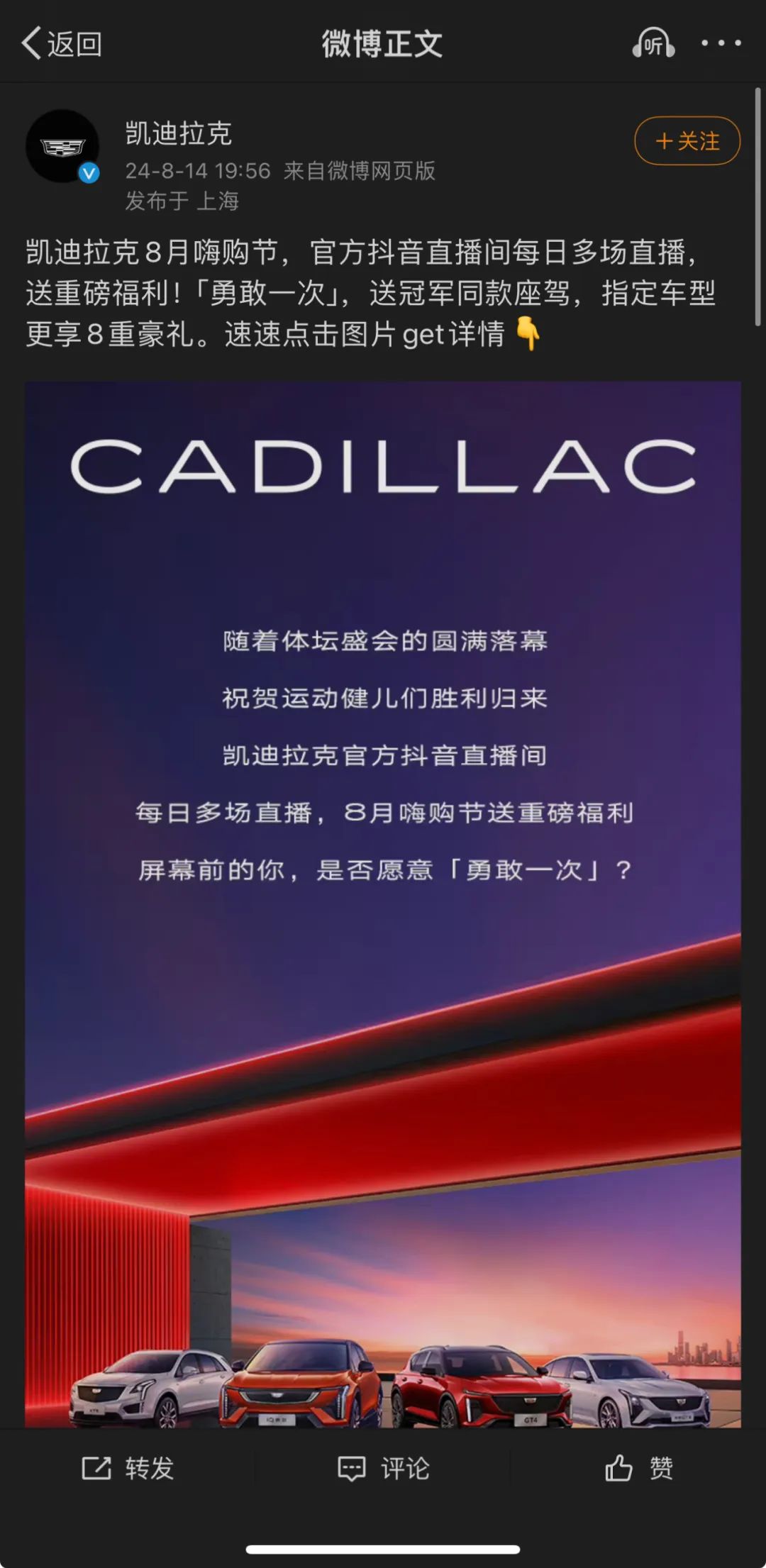
Cadillac Launches "August Shopping Festival", Image/Cadillac's official Weibo
Overall, netizens' opinions on Cadillac's actions are mixed, but it is clear that this sales strategy has already had an effect, at least increasing brand exposure.
Thus, the current public opinion crisis facing ZEEKR serves as a reminder to all automakers:
As market competition intensifies, they must still exercise caution in capturing consumers' minds and expanding their market share, making fewer or no mistakes. At this stage, every mistake made is detrimental to oneself and beneficial to others.
"Making fewer mistakes" is not limited to products and technology but also includes strategic judgment, sales strategies, service, executive statements, and other aspects.
Over the past six months, the failure of Lixiang MEGA and the " Overturning " (a Chinese internet slang term meaning "making a blunder") of Nezha Automobile CEO Zhang Yong are cautionary tales.
Lixiang's first pure electric model, MEGA, was launched in March this year, carrying the company's high hopes for entering the pure electric market. However, due to controversies over its appearance and pricing, MEGA's sales have significantly missed Lixiang's expectations. Lixiang set an annual sales target of 80,000 units for MEGA, but it sold only 3,229 units in its first month and 1,145 units in its second month.
Later, Li Xiang reflected that MEGA's failure stemmed from Lixiang's misjudgment of its pure electric strategy, mistakenly treating MEGA's "from 0 to 1" phase (commercial validation) as its "from 1 to 10" phase (rapid development).
This failure also directly led Lixiang to switch its pure electric vehicle strategy back from "aggressive" to "conservative." According to the original plan, 2024 was supposed to be a big year for Lixiang, with the launch of new models including MEGA, the 2024 L series, the L6, and three pure electric vehicles. However, at its earnings call on May 20, Li Xiang announced that all pure electric vehicles except MEGA would be postponed until 2025.
Another example is Nezha Automobile CEO Zhang Yong, who was perceived as arrogant during a live stream earlier this year due to his crossed legs, in stark contrast to Lei Jun's humility. In his response, Zhang Yong used the derogatory term "tian gou" (a Chinese internet slang term for "flatterer"), which sparked controversy and negatively impacted the brand's image to some extent.
In summary, from an industry perspective, ZEEKR's current controversy is merely an interlude, but it is enough to remind all automakers:
Don't be too hasty, don't take chances, and make fewer mistakes.







